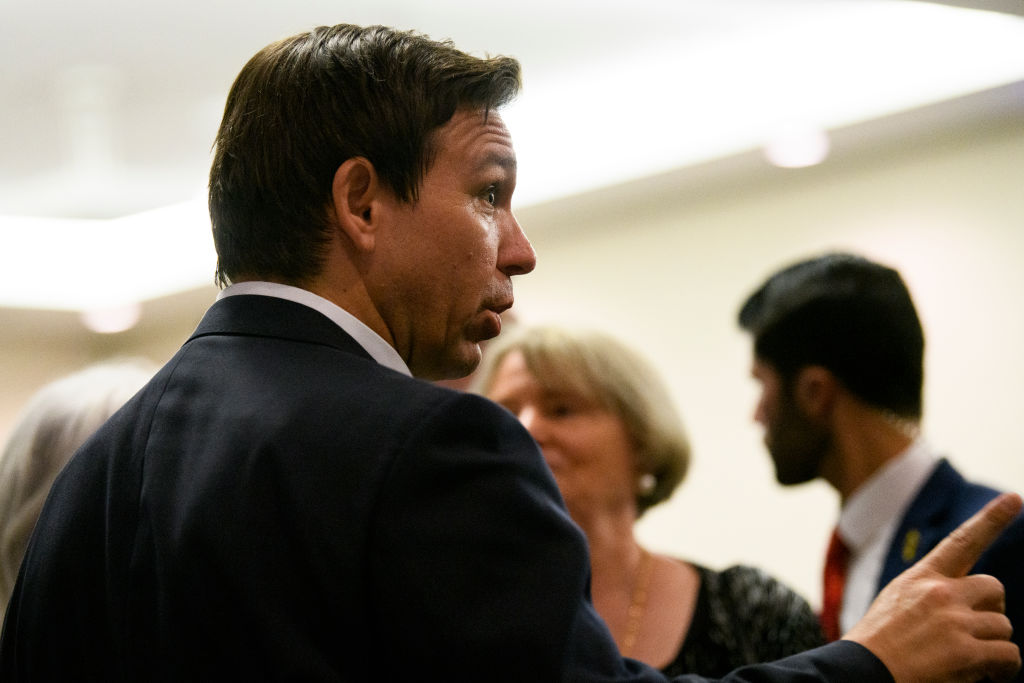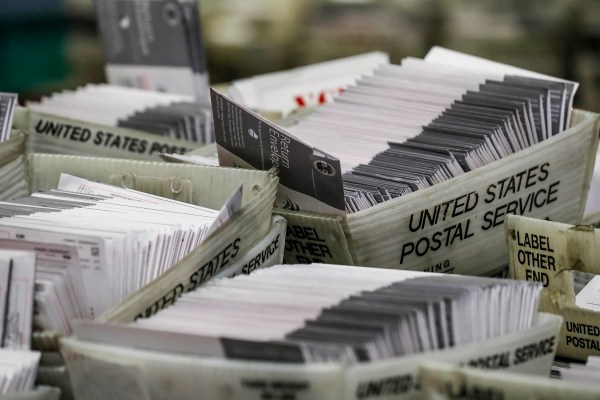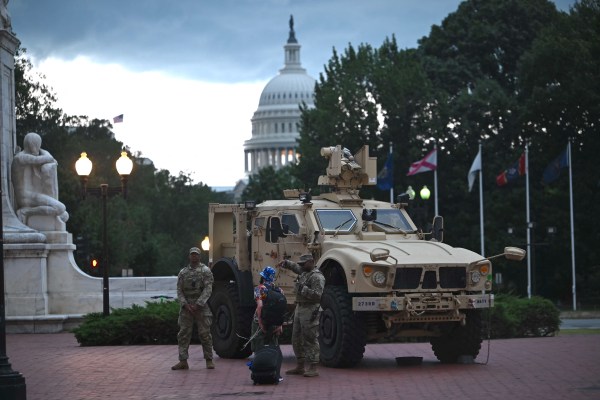Happy Thursday! The days of free riding off a friend or relative’s Netflix account are coming to an end, as the company finally begins to crack down on password sharing.
If you’re caught breaking the rules, the streamer might have to sic its new Chief Action Officer on you.
Quick Hits: Today’s Top Stories
- U.S. intelligence officials reportedly now believe the Ukrainian military may have executed a drone attack on the Kremlin earlier this month. The intelligence assessment is purportedly based partly on intercepted Russian and Ukrainian communications—American officials say their confidence that the Ukrainian government has a direct role is “low” as they cannot identify the specific Ukrainian units or leaders responsible. President Volodymyr Zelensky previously denied Ukrainian involvement in the attack, and some U.S. officials reportedly believe he was unaware of it.
- State Department official Rick Waters—head of the department’s internal China policy shop—announced Wednesday he will step down by the end of next month. Waters is the third top U.S. official focused on China to announce an exit in recent months: Laura Rosenberger, the National Security Council’s senior director for China and Taiwan, left her position in March, and Deputy Secretary of State Wendy Sherman, a point person on China policy, announced her retirement earlier this month.
- Supreme Court Chief Justice John Roberts said in a speech Tuesday that he plans to address ethics concerns surrounding the court, though he didn’t specify how. “I am committed to making certain that we as a court adhere to the highest standards of conduct,” Roberts said at the American Law Institute’s annual dinner. “We are continuing to look at things we can do to give practical effect to that commitment, and I am confident there are ways to do that that are consistent with our status as an independent branch of government under the Constitution’s separation of powers.” Roberts declined to testify at a Senate Judiciary hearing last month on the court’s ethics rules, citing the precedent of judicial independence.
- The House voted 218-203 Wednesday to pass a resolution which would overturn the Biden administration’s student debt relief program and remove the pause on federal student loan payments. President Joe Biden has pledged to veto the measure, but the forgiveness plan is already on hold as the Supreme Court weighs its constitutionality. Loan payments are set to resume 60 days after the court’s ruling.
- Mayor Trent Staggs of Riverton, Utah, announced Tuesday he will challenge Sen. Mitt Romney for the state’s GOP Senate nomination in 2024. Romney, 76, has not confirmed whether he plans to run for reelection.
- Rock-and-roll superstar Tina Turner died yesterday at age 83 after what her spokesperson said was a long illness. Born Anna Mae Bullock in 1939, Turner began her singing career alongside her husband Ike Turner in the 1960s and ‘70s. She divorced him after suffering physical abuse and began a meteoric solo career with her 1984 album “Private Dancer,” which won four Grammys.
DeSantis’ Twitter Debut

Coming on the heels of one of the “most productive” legislative sessions in Florida history, the statement “I will get the job done,” from Republican Gov. Ron DeSantis Wednesday night to several hundred thousand circular profile pictures might sound believable. But DeSantis’ pitch to GOP primary voters–“Trump, but competent”—was immediately put to the test yesterday with his campaign launch.
After months of build-up and “will he, won’t he” speculation that always circled back around to “he will,” DeSantis tried to announce his 2024 presidential bid last night in an audio-only Twitter Spaces chat with the platform’s owner, Elon Musk. Initially hoping to be a part of a “groundbreaking” new frontier in free speech and presidential campaigning, the governor probably wishes he’d been a little less avant-garde in his approach.
Originally billed to start at 6 p.m. ET, the event—hosted on Musk’s Twitter account—began with eight-and-a-half minutes of silence, eventually interrupted by ear-splitting microphone reverb and followed by whispering from DeSantis. “Now it’s quiet,” the governor said in his first public utterance since he filed the paperwork Wednesday to run for president.
Bullets in Belgorod
A security service building in flames. Drone footage capturing plumes of smoke rising from a village. Houses missing chunks of their walls. Such scenes are commonplace in Ukraine these days as its troops fight off Russian invaders—but this week, they played out inside Russia’s borders.
Ukrainian leaders have denied involvement in the attacks on towns in Russia’s Belgorod region—across the border from Ukraine’s Kharkiv oblast—and two anti-Putin paramilitary groups made up of Russians have claimed responsibility. But the fighters may have used American-made equipment in their attack, and they claim to have communicated with Ukrainian leadership about the raid. This episode—the latest in a string of semi-mysterious attacks on Russian soil—is a concern for Biden administration officials anxious to avoid escalating toward direct conflict with Russia.
The Freedom for Russia Legion and Russian Volunteer Corps—motley collections of anti-Putin Russians with some far-right nationalists in the ranks—took responsibility for the attacks, claiming to have overrun multiple villages earlier this week. As is typical in the fog of war, neither side of the conflict has presented evidence supporting their claims—but Russian officials said they had quickly repelled the groups back to Ukraine and killed dozens of their fighters, while leaders of the attackers claimed the fight for Belgorod had lasted days and forced the Russian armed forces to divert forces and resources from the front in Ukraine.
Members of both anti-Putin paramilitary groups have served under Ukrainian military leadership as international volunteers, and a Freedom for Russia Legion member known as “Caesar” told CNN Ukrainian leaders have provided the unit with “small arms, artillery weapons, heavy vehicles, everything.” But Ukrainian officials deny involvement in this week’s attacks. “We can confirm that this operation is carried out by Russian citizens,” Ukrainian Defense Intelligence representative Andriy Yusov told CNN. “In Ukraine, these units are part of defense and security forces. In Russia, they are acting as independent entities.”
Still, the paramilitary groups seem to have at least given Ukrainian officials a heads-up. An anonymous Ukrainian official told the New York Times Ukraine had positioned troops near the border in anticipation of a counterattack after the raid. “The approval for the operation was received,” Ilya Ponomarev, a former Russian member of parliament who now acts as the political representative for the pro-Ukrainian Russian fighters, told Charlotte for a piece on the site today. “But the planning, the organization, the day-to-day command is all in the hands of Russians, and not a single Ukrainian soldier has crossed the Ukraine-Russia border.”
Ukrainian forces may not have crossed the border into Russia, but it looks like American-made equipment did—though it’s still unclear whether that equipment came from Ukraine’s stocks or was purchased elsewhere. The Times said it had verified footage of at least three American-made armored vehicles involved in the attacks, and Russian forces claimed to have captured at least two. But American officials seemed to be caught off guard by the reports this week and vowed to investigate further. “The U.S. government has not approved any third-party transfers of equipment to paramilitary organizations outside the Ukrainian Armed Forces, nor has the Ukrainian government requested any such transfers,” Pentagon spokesman Brig. Gen. Pat Ryder said Tuesday. State Department spokesman Matt Miller emphasized Wednesday the U.S. doesn’t “encourage or enable attacks beyond the borders of Ukraine,” but declined to comment on possible repercussions for U.S. aid to Ukraine if it turns out U.S.-supplied equipment was used in the attacks.
This week’s border fights are the latest of several such incidents, including other incursions along the border claimed by these paramilitary groups in recent months. Perhaps hoping to disrupt further invasion efforts, it’s possible Ukrainian officials have directed their own limited strikes on Russian soil—U.S. officials reportedly believe Ukraine’s government authorized a car bombing near Moscow that killed the daughter of a Russian nationalist in August, and may also have executed a drone attack on the Kremlin this month that caused limited damage.
The border incursions could force Russia to beef up its defenses. Pro-Ukrainian media reported a motorized rifle brigade is being moved to the area, and any Russian troops sent to defend are troops not being deployed on the frontline, a boost for Ukrainian defenders trying to launch a counteroffensive. Perhaps even more importantly, these incidents are a shock to already low Russian morale. The Institute for the Study of War reported this week’s border attacks “took Russian commentators by surprise” and that they reacted with a “degree of panic, factionalism, and incoherency.”
“It’s psychologically significant,” said Gian Gentile, associate director of the RAND Corporation’s Arroyo Center. “Russian soldiers have cell phones, so they’ve got access to news. They’re certainly aware of what happened there.”
Worth Your Time
- Academia lost a great one this week when Robert Zimmer—the longtime president of the University of Chicago—succumbed to brain cancer at the age of 75. He was a brilliant mathematician, but one of his most enduring legacies will be the work he did to champion freedom of expression on his campus—and on dozens of campuses around the country. “The University’s fundamental commitment is to the principle that debate or deliberation may not be suppressed because the ideas put forth are thought by some or even by most members of the University community to be offensive, unwise, immoral, or wrong-headed,” reads a 2014 UChicago statement, which Zimmer spearheaded. “It is for the individual members of the University community, not for the University as an institution, to make those judgments for themselves, and to act on those judgments not by seeking to suppress speech, but by openly and vigorously contesting the ideas that they oppose. Indeed, fostering the ability of members of the University community to engage in such debate and deliberation in an effective and responsible manner is an essential part of the University’s educational mission. As a corollary to the University’s commitment to protect and promote free expression, members of the University community must also act in conformity with the principle of free expression. Although members of the University community are free to criticize and contest the views expressed on campus, and to criticize and contest speakers who are invited to express their views on campus, they may not obstruct or otherwise interfere with the freedom of others to express views they reject or even loathe. To this end, the University has a solemn responsibility not only to promote a lively and fearless freedom of debate and deliberation, but also to protect that freedom when others attempt to restrict it.”
Rest in Peace, Queen
Presented Without Comment
National Review: Hunter College Professor Fired after Vandalizing Pro-Life Display, Threatening Reporter with Machete
Also Presented Without Comment
The Hill: Bipartisan Sneaker Caucus ‘Unequivocally Supports’ [House Speaker Kevin] McCarthy, [House Minority Leader Hakeem] Jeffries’ Oval Office Shoe Choices
Toeing the Company Line
- In the newsletters: Scott explains why (🔒) we should be wary of AI companies demanding greater regulation, the Dispatch Politics team takes a look at the fledgling DeSantis campaign, Jonah explores (🔒) the cult of Buttigieg, and Nick offers (🔒) one cheer for DeSantis.
- On the podcasts: Sarah and David react to the Supreme Court’s ruling on social media regulations, while Jonah and Guy field listener questions.
- On the site: As mentioned above, Charlotte digs into the forces at play in Belgorod. Plus, Richard Goldberg and Andrea Stricker of the Foundation for Defense of Democracies argue the U.S. and its European partners should threaten Iran with sanctions snapback if it continues to flout international nuclear safeguards.
Let Us Know
What details—if any—do you remember from presidential announcements in years past? Do you think last night’s technical snafus will end up having any meaningful effect on DeSantis’ chances?










Please note that we at The Dispatch hold ourselves, our work, and our commenters to a higher standard than other places on the internet. We welcome comments that foster genuine debate or discussion—including comments critical of us or our work—but responses that include ad hominem attacks on fellow Dispatch members or are intended to stoke fear and anger may be moderated.
With your membership, you only have the ability to comment on The Morning Dispatch articles. Consider upgrading to join the conversation everywhere.